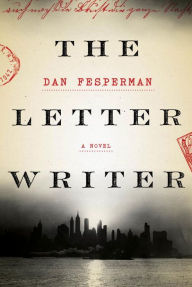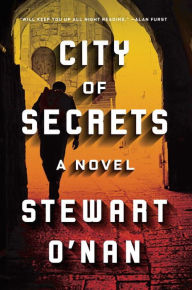 I raced through Chris Pavone’s clever first thriller, The Expats, when it came out in 2012 and wished then for a sequel, but his next two books, The Accident and The Travelers, had only tenuous ties to the first book. But The Paris Diversion (Crown Archetype, digital galley) is the knotty, twisted follow-up I wanted, with expats Kate (wife, mom, spy) and day-trader Dex — returning, only to have the past catching up with them big-time. You don’t have to have read the The Expats, as long-ago events are briefly explained, but, really, you should. Otherwise, certain revelations might not hit you like a quick punch to the gut. Pavone ups the tension by having most of the narrative unfold during one day in tourist-packed Paris, where a suicide bomber plants himself and a briefcase in the courtyard of the Louvre. The city, wounded by previous terrorist acts, is nonetheless surprised, as are a rotating cast of characters: Kate, who was planning a dinner party, dons disguises and looks over her shoulder; Dexter tries to put together a mega-deal before the markets tumble; a corporate tycoon is whisked into hiding by his security deal; assorted assassins, spies and bad actors race through alleyways and the Metro. There will be blood. Things are not what they seem. More, please.
I raced through Chris Pavone’s clever first thriller, The Expats, when it came out in 2012 and wished then for a sequel, but his next two books, The Accident and The Travelers, had only tenuous ties to the first book. But The Paris Diversion (Crown Archetype, digital galley) is the knotty, twisted follow-up I wanted, with expats Kate (wife, mom, spy) and day-trader Dex — returning, only to have the past catching up with them big-time. You don’t have to have read the The Expats, as long-ago events are briefly explained, but, really, you should. Otherwise, certain revelations might not hit you like a quick punch to the gut. Pavone ups the tension by having most of the narrative unfold during one day in tourist-packed Paris, where a suicide bomber plants himself and a briefcase in the courtyard of the Louvre. The city, wounded by previous terrorist acts, is nonetheless surprised, as are a rotating cast of characters: Kate, who was planning a dinner party, dons disguises and looks over her shoulder; Dexter tries to put together a mega-deal before the markets tumble; a corporate tycoon is whisked into hiding by his security deal; assorted assassins, spies and bad actors race through alleyways and the Metro. There will be blood. Things are not what they seem. More, please.
 Before she was beach book queen Mary Kay Andrews, my pal Kathy Trocheck wrote the Callahan Garrity mystery series, so she usually includes a mystery subplot in her summery novels like Savannah Breeze and The High Tide Club. It might be a scam, an unexpected inheritance, long-ago family secrets. All of these, plus a cold case murder, figure in Andrews’ new charmer, Sunset Beach (St. Martin’s, ARC), which features down-on-her-luck Drue Campbell. After her mother’s death, Drue’s long-estranged father Brice gives her a job at his personal injury law firm, where his latest wife Wendy, who went to middle school with Drue, is the office manager. It’s pretty awful, but at least Drue can live in the run-down Florida beach house she inherited from her Cuban grandparents. She might even make enough money to renovate it, or at least put in AC. Cleaning out the attic, she stumbles on the cold-case disappearance of Colleen Hicks, which links to the days when her father was a beat cop. Drue can’t resist some sleuthing; she’s already looking into the death of a resort hotel housekeeper, whose mother and young daughter badly need insurance money. Drue’s varied attempts to access the resort in search of evidence make for entertaining set pieces, while flashbacks to 40-years-ago Florida add atmosphere and suspense. And just so you remember Sunset Beach is trademark Mary Kay Andrews, Drue also makes time for decorating with cast-off treasures, deals with family drama and finds a little romance. I see a sequel.
Before she was beach book queen Mary Kay Andrews, my pal Kathy Trocheck wrote the Callahan Garrity mystery series, so she usually includes a mystery subplot in her summery novels like Savannah Breeze and The High Tide Club. It might be a scam, an unexpected inheritance, long-ago family secrets. All of these, plus a cold case murder, figure in Andrews’ new charmer, Sunset Beach (St. Martin’s, ARC), which features down-on-her-luck Drue Campbell. After her mother’s death, Drue’s long-estranged father Brice gives her a job at his personal injury law firm, where his latest wife Wendy, who went to middle school with Drue, is the office manager. It’s pretty awful, but at least Drue can live in the run-down Florida beach house she inherited from her Cuban grandparents. She might even make enough money to renovate it, or at least put in AC. Cleaning out the attic, she stumbles on the cold-case disappearance of Colleen Hicks, which links to the days when her father was a beat cop. Drue can’t resist some sleuthing; she’s already looking into the death of a resort hotel housekeeper, whose mother and young daughter badly need insurance money. Drue’s varied attempts to access the resort in search of evidence make for entertaining set pieces, while flashbacks to 40-years-ago Florida add atmosphere and suspense. And just so you remember Sunset Beach is trademark Mary Kay Andrews, Drue also makes time for decorating with cast-off treasures, deals with family drama and finds a little romance. I see a sequel.
 Sarah Blake’s The Guest Book (Flatiron Books, digital galley) is one of those sprawling, multi-generational family sagas that seems designed for long, lazy days in a hammock. The writing is so lovely that it almost lulls you into forgetting that you’re reading about some of the worst aspects of the so-called “best” people. The Miltons are wealthy, white, privileged. They own a small island off the coast of Maine, bought by banker Ogden in the depths of the Great Depression to help his young wife Kitty recover from a family tragedy. This is where the Miltons summer over the years, and the book skips around in time, from Ogden’s pre-war business interests in Germany and a fateful decision on Kitty’s part; to 1959, when their three children invite outsiders, including a Jewish banker and an African-American writer-photographer, to the island retreat for what should be a celebration; to the present, when Milton granddaughter and Kitty lookalike Evie and her cousins must decide the island’s future now that fortunes have dwindled and family secrets are about to be revealed. Blake weaves issues of class, race and religion into the involving narrative as the Miltons and their connections ambitiously embody the social history of America in the 20th century. I kept thinking I’d read most of it before in summer sagas of seasons past, such as Beatriz Williams’ A Hundred Summers or Anne Rivers Siddons’ Colony. That’s okay. What’s old is new again for summer 2019.
Sarah Blake’s The Guest Book (Flatiron Books, digital galley) is one of those sprawling, multi-generational family sagas that seems designed for long, lazy days in a hammock. The writing is so lovely that it almost lulls you into forgetting that you’re reading about some of the worst aspects of the so-called “best” people. The Miltons are wealthy, white, privileged. They own a small island off the coast of Maine, bought by banker Ogden in the depths of the Great Depression to help his young wife Kitty recover from a family tragedy. This is where the Miltons summer over the years, and the book skips around in time, from Ogden’s pre-war business interests in Germany and a fateful decision on Kitty’s part; to 1959, when their three children invite outsiders, including a Jewish banker and an African-American writer-photographer, to the island retreat for what should be a celebration; to the present, when Milton granddaughter and Kitty lookalike Evie and her cousins must decide the island’s future now that fortunes have dwindled and family secrets are about to be revealed. Blake weaves issues of class, race and religion into the involving narrative as the Miltons and their connections ambitiously embody the social history of America in the 20th century. I kept thinking I’d read most of it before in summer sagas of seasons past, such as Beatriz Williams’ A Hundred Summers or Anne Rivers Siddons’ Colony. That’s okay. What’s old is new again for summer 2019.











